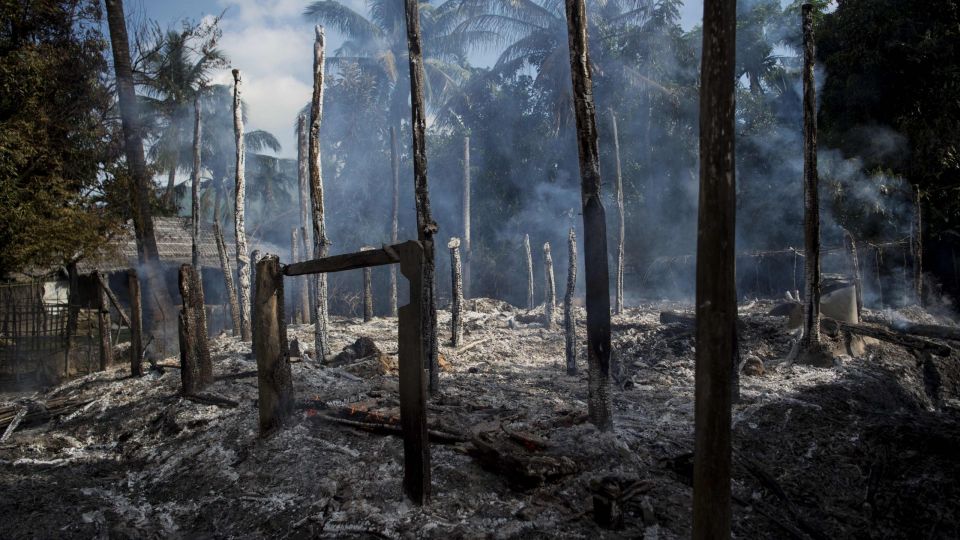June 27, 2018
Over a year after hundreds of thousands of Rohingya refugees fled from Myanmar to Bangladesh, no end is in sight for the Rohingya crisis.
The United Nation’s High Commissioner for Refugees estimates that around 720,000 Rohingya refugees have crossed the border from Myanmar to Bangladesh since August 2017.
Since then, the refugees have been living in camps and makeshift homes along the border while negotiations over repatriation and assistance have gone nowhere.
Myanmar has denied orchestrating widespread ethnic violence against the minority group saying that security officials were responding to sporadic attacks by Rohingya militants.
International Criticism
In March, a United Nations special adviser said that the body was gathering evidence of a possible genocide against the Rohingya through a Judicial investigation.
The statement came after the United Nations Assistant Secretary-General for Human Rights Andrew Gilmour said that Myanmar’s treatment of the Rohingya amounted to “ethnic cleansing.”
“It appears that widespread and systematic violence against the Rohingya persists . . . I don’t think we can draw any other conclusion from what I have seen and heard in Cox’s Bazar,” Gilmour said at the time.
Since then a prosecutor for the International Criminal Court has asked the court to rule whether it has jurisdiction over the possible crimes against humanity committed over the deportations of the Rohingya by Myanmar forces.
A ruling is currently pending.
Other international bodies have added to the voices accusing Naypyidaw of ethnic violence.
The European Union imposed sanctions on seven senior military officials from Myanmar on Monday, including the Major General Maung Maung Soe, who was in charge of the operation which resulted in accusations of murder, rape and arson by security officials.
“He is responsible for the atrocities and serious human rights violations committed against (the) Rohingya population in Rakhine State by the Western Command during that period,” the EU said in a statement.
The seven face asset freezes and are banned from travelling to the EU, after the bloc extended an arms embargo and prohibited any training of, or cooperation with Myanmar’s armed forces.
Myanmar Response
In response, Myanmar dismissed General Maung Maung Soe, who had already been placed on the list of reserves before his dismissal.
“Maj-Gen Maung Maung Soe, who is among seven military officers on the EU list, was dismissed from service by the Tatmadaw (army) on Monday,” a statement by the office of Myanmar’s commander-in-chief said.
The main reason behind Maj Gen Maung Maung Soe’s expulsion from military service was said “poor performance” in managing “security plans” under the emergency in the aftermath of attacks by the Arakan Rohingya Salvation Army on police and military outposts in October 2016 and August 2017 in northern Rakhine State.
Despite the dismissal, Suu Kyi’s government has rejected any responsibility in the ethnic violence in Rakhine State last year. It continually cites sporadic small-scale attacks by groups of militants towards security officials as justification for its crackdown on the Rohingya population.
Suu Kyi said that “foreign narratives” were biased towards her country has limited access to Rakhine state to investigators and journalists.
While a negotiated repatriation program was concluded between Bangladesh and Myanmar, practical elements are unseen. The repatriation of one Rohingya family was widely criticized by rights groups and journalists as being merely for show.
Moving Forward
The database will help the Rohingyas to exercise their right to voluntary return to Myanmar.
The UN Refugee Agency in Bangladesh yesterday said the verification exercise, which began on June 21, will help consolidate a unified database for the purposes of identity management, documentation, protection, and provision of assistance, population statistics and solutions for the Rohingyas.
All refugees over the age of 12 will be provided with identity cards, which were made using biometric data, including iris scans and fingerprints, as well as photographs, to confirm individual identities, said the UNHCR in a press release.
The credit card-sized plastic ID, containing a number of anti-fraud features, is issued jointly by the Government of Bangladesh and the UNHCR and will provide protection and access to assistance in Bangladesh, it added.
However, voluntary return to Myanmar is unlikely. According to rights groups, the refugees in camps along the border still view Myanmar security forces with distrust and say they fear for their safety should they return.


